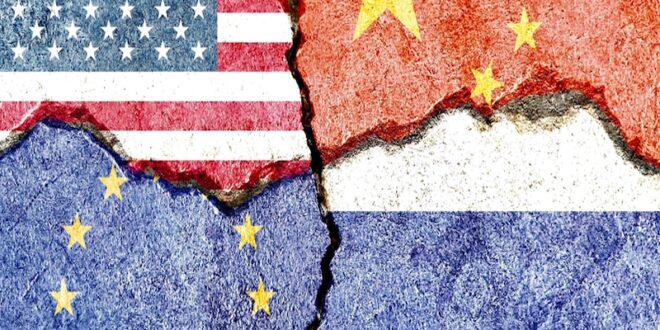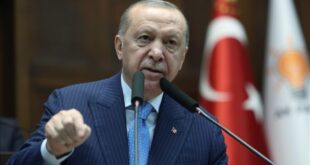For a long time, the White House’s hardliners have tried to pull Europe into their conflict with China. They need this conflict to preserve their dominant position and to keep Europe more reliant on them. They use Russia’s war with Ukraine, China’s technological advancement, and their exaggerated emphasis on democratic alliances against totalitarian regimes – as they claim – as part of their grand strategy of security and intimidation against China in the global arena. The issue is that Europe has always been a pawn for the Americans in this scenario. The Americans want to instill fear in Europe about security by portraying China as a systemic threat and linking China and Russia to global instability.
The US has used the Ukraine crisis as a chance to reinforce its strategic deterrence strategy, which is supported by allies like Britain and Poland, as well as pro-Atlantic politicians like Ursula von der Leyen in Europe. The US strategy of increasing tensions with China has hindered Europe from acting against US competition with China, and even when dissenting voices are raised, they are silenced or ignored. This is the case for French President Emmanuel Macron, who wants to prevent Europe from becoming a strategic subject of Washington.
Countries like Germany, France, Italy, and even the United Kingdom do not benefit from increasing tensions with China or from forming a bipolar bloc of good and evil, or democracies versus dictatorships. However, these countries have to align with the U.S. perspective of China as a threat to the survival of the liberal-American world order. Nonetheless, Europe now views China as a systemic competitor rather than an immediate threat. At this stage, they seek not to decouple relations with Beijing but to de-risk relations with China.
The US and European policy towards China is based on three elements: cooperation (in areas such as climate change and pandemics), competition (in the economic area), and containment (in the areas of technology, confronting Beijing’s military actions in the South China Sea, and military support for Taiwan). This means the West’s strategy toward China involves both cooperation and competition. The issue is that European countries’ perception of the optimal policy towards China does not match America’s perception of its interests.
Beijing is well aware that European countries have the strongest economic and trade relations with China among the countries of the world, especially in the area of technology and the supply of some essential goods. They only criticize China’s human rights policy and Beijing’s policies towards Taiwan, which are more like rhetorical gestures than serious threats and are tolerable for Beijing.
Unlike France, which cautions Europe against a conflict in Taiwan, Germany stresses the importance of Taiwan’s stability and security and assures that it will not let down the US and Taiwan. China recognizes that this reflects Germany’s security reliance on the US and US’s efforts to paint a picture of China as a provocateur. This is far from the independent strategic policy that one would expect from a geo-strategic country like Germany.
Even if Foreign Minister Elena Bauerbok points to the hardline positions of the Greens and the agreement with Prime Minister Olaf Schulz to suspend the transfer of the port of Hamburg to a Chinese company, it is merely an internal demonstration to please the hardliners of the Green Party and has little political or economic value.
The main problem is that Europe cannot act on its own authority and in accordance with the Union’s interests to sanction or alter its relations with China. If Germany’s government and parliament decide to restrict the Chinese social network Tik Tok, which is accused of spreading misinformation, they will cause more trouble for themselves than for China. For example, the Dutch government eventually succumbed to the US’s technology sanctions against China, and the Dutch technology companies, especially those involved in producing semiconductor devices, suffered heavy losses.
The US has tried to make Europe reliant on itself, but this has created divisions within the European Union. For example, according to Macron’s foreign policy vision, Europe cannot succeed if it follows US policies. He argues that this will not only worsen the unequal relations between Europe and China, especially in trade but also cause more losses for Europe. Therefore, under Macron’s leadership, Paris still pursues the idea of European strategic autonomy and wants Europe to be an influential player in the multipolar world of the US and China. He has shown that he does not want to join the US-China rivalry or align with the US to contain China.
Von der Leyen, the president of the European Commission, is the only one who supports the US policies of containing China and tries to make Europe adopt a harder stance towards China, but she has not succeeded yet. She fears that China will create a new world order with non-Western countries and become a power that threatens the current US-led world order, which has been beneficial for Europe for years.
It is noteworthy that the US is pushing Europe to decouple its economy from China and exclude Beijing from the global production and supply chain. At the same time, it protects its own companies from international and European rivals by enforcing protectionist laws such as the “Inflation Reduction Act”. In fact, while the European economy faces significant pressure from the Ukraine war, the US-China tension, and the US economic protectionism, the Americans are still trying to make the European Union more dependent on them and prevent it from achieving strategic and technological autonomy. This US strategy aims to prevent the rise of a third pole in world politics. The US only cooperates with Europe and other countries as long as its own interests are secured and it benefits from their losses.
The US has benefited from the Ukraine war by emphasizing the Russian threat as an imminent danger to Europe. Therefore, it is not surprising that the US does not want to end the war, but rather to prolong and worsen it. Meanwhile, Europe is more concerned about the consequences of the war and the loss of the chance to reach a peace deal with Russia due to the US provocations. Europe has become a pawn of the US in its rivalry with China.
 Eurasia Press & News
Eurasia Press & News




